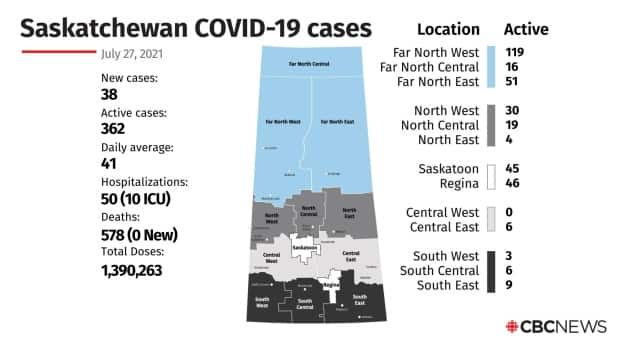Sask. First Nation calls for nurses, health orders due to COVID-19 outbreak

The chief of Buffalo River Dene Nation is seeking more nurses and enforceable public health orders to curb the spread of COVID-19 as an outbreak stresses community resources.
On Monday, the Federation of Sovereign Indigenous Nations (FSIN), which represents Saskatchewan's First Nations, called on the province to provide aid to Buffalo River as cases rose in the northwestern community, west of La Loche. An FSIN spokesperson said the call for support was meant to amplify the community's voice.
Public health officials at the Northern Inter-Tribal Health Authority declared an outbreak in the community on Friday.
"We need more health people there, like nurses and that, because the four nurses that we have are working two at a time because they're getting burned out," said Chief Elmer Campbell.
"A good majority of the people are following the isolation protocols, it's just a few that we're having trouble with."
Campbell said the younger population is contributing most to the transmission.
Buffalo River said it's working with the Meadow Lake Tribal Council to receive health personnel from Indigenous Services Canada and with the Northern Inter-Tribal Health Authority to implement public health orders. The health authority could recommend that the chief medical health officer (CMHO) instate a localized health order, according to the province.
Without health orders, RCMP don't have the authority to break up gatherings or force those infected with COVID-19 to isolate.
In an email, a spokesperson for the Saskatchewan Ministry of Health said that the province is "in touch" with medical health officers at the northern health authority about the outbreak, including additional supports that could aid Buffalo River's efforts. However, "at this time, the province has not received a request to consider additional public health measures."
The health authority did not immediately provide comment or clarification on whether that process was underway.
COVID-19 in Buffalo River
There are about 800 people living in the community, according to the most recent government population numbers from June 2021.
Those records don't include people from other reserves living in the community, or people not registered as status Indians. Community officials say the actual number is closer to 900 people.
There were 70 active cases in the community as of Monday. About 56 were variants of concern, according to community officials.
The community makes up about 59 per cent of the cases in the northwest region, which already has the most cases of any Saskatchewan region. There were as many as 86 active cases on Sunday.

Watching the numbers rise is frustrating for Norma Catarat, the pandemic co-ordinator for the First Nation. She said that while other cities and communities may have been prepared for public health restrictions to lift, their community was not.
"The legislation and regulations were lifted without any consultation [with] us and then now we are in this dilemma with all our cases going up and our support is not there," she said.
"We had an outbreak in January and because of the legislation we had it under control and our numbers went down within a matter of weeks."
Fewer vaccinations in the community
Campbell puts the weight of rising cases on those in the community who haven't been vaccinated. He said he believes the virus was reintroduced to the community after an evacuation from wildfires and residents travelling to nearby urban areas.
Across the province, 74 per cent of those eligible for vaccines have received their first dose, and 60 per cent are fully vaccinated.
According to the most recent count in Buffalo River, about 39 per cent of the community had received one dose and 25 per cent had been fully vaccinated.
That's even after leaders offered cash incentives, like $50 to those who get vaccinated.
"People are just tired of being locked down and told to quarantine and isolate. Our security has had more problems with people that just didn't want to adhere to those rules. You know, you had people driving through security without stopping and stuff like that," Campbell said.
Opposition NDP Leader Ryan Meili said that the government needs to promote vaccines in communities like Buffalo River with low rates of uptake. He says that work hasn't been done so far.
"I'm hearing from leaders in the north: one, their frustration that that work wasn't done, and two that they are really upset that Scott Moe just said, 'We're not going to even try to give you any opportunities to do public health measures.'"

During a news conference on Tuesday, Saskatchewan Health Minister Paul Merriman said that there are no plans to make widespread public health orders mandating isolation for people who test positive for COVID-19.
The provincial public health order required isolation, but since it was lifted on July 11 residents who test positive for COVID-19 aren't required by law to quarantine.
Medical health officers, however, can order individuals to isolate. Those who don't abide by those orders can be fined up to $2,800.
Merriman noted communities with low vaccination rates are being most affected.
"Obviously, we're working with all of our northern communities to make sure that they have vaccines first of all and there's a good understanding of the public health orders that were in place and just general practices within COVID," he said.
"Everybody in Saskatchewan should have access to a vaccine right now, if they choose not to get that, that's their choice."

 Yahoo Movies
Yahoo Movies 